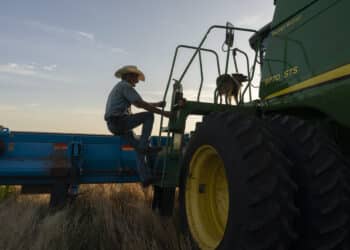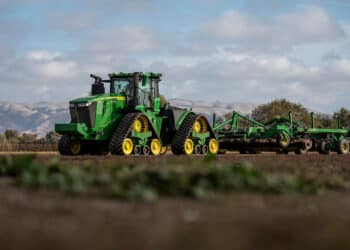Top 5 agriculture stories of 2024
Farm equipment industry struggles through slowdown
Equipment Finance News’ most-read agriculture stories in 2024 show readers’ interest in how the agriculture industry’s prolonged downturn affected the entire equipment market. Farmers felt the impact of higher interest rates, lower commodity prices and rising costs, which resulted in pressures on equipment dealers, lenders and OEMs.
1. Farm equipment industry faces prolonged downturn
Following a difficult first quarter, which saw sales dip double-digits in February, farm financial concerns began turning into a prolonged downturn for the entire farm equipment industry.
Higher input costs, such as fertilizer, seed, energy and some machinery and interest rates, in conjunction with lower commodity and livestock prices, represented serious concerns for farmers following the slowdown in Q1 and continued to pressure them throughout the year. As 2025 begins, effects from the downturn continue to limit the farm equipment industry.
2. Agricultural dealers brace for slowdown
In response to the farm economy downturn, including declining commodity prices, agricultural equipment dealers braced for a challenging market as farmers cut back on spending. One dealer, H&R Agri-Power, anticipated a 15% to 25% sales decline, as lower yields limited farmers’ ability to finance new equipment despite manufacturers offering attractive financing options.
Meanwhile, inventory levels surged across all equipment categories, with asking values for new and used equipment rising, while auction values trended downward, increasing financial strain for dealers.
3. John Deere, AGCO lay off workers amid ag slowdown
Agriculture equipment manufacturers John Deere and AGCO implemented workforce reductions in response to the agricultural economy slowdown and declining net farm income. John Deere laid off approximately 590 employees across three U.S. production facilities, effective Aug. 30, but outlined recall opportunities for affected workers based on seniority and qualifications.
Meanwhile, AGCO launched a restructuring program aimed at cutting structural costs and streamlining operations, with a projected 6% reduction in its salaried workforce by the end of 2023.
4. John Deere settles for $10M with SEC
Agriculture equipment manufacturer John Deere agreed to a $10 million settlement with the U.S. Securities and Exchange Commission for violations of the Foreign Corrupt Practices Act involving its subsidiary Wirtgen Thailand. The SEC found that Wirtgen Thailand had made improper payments to foreign officials and private employees, which resulted $4.3 million in profits.
Deere’s fine, while modest compared to larger settlements, reflects an increased crackdown in compliance when integrating acquisitions. The fine also added to the overall down year for the manufacturer.
5. Net farm income forecast down 4%
U.S. net farm income projected to decline to $140.7 billion in 2024, down 4.1% from 2023 and 22.6% from its 2022 peak, with inflation-adjusted declines deepening to 6.3%, according to the USDA’s December forecast.
While declining for the second straight year, the net farm income forecast improved compared to the original forecasted decline of 25.5% year over year released in February, as crop yields and commodity prices exceeded expectations. Farmers remain hopeful for improved conditions in the next five years, despite immediate financial pressures.
The third annual Equipment Finance Connect at the JW Marriott Nashville in Nashville, Tenn., on May 14-15, 2025, is the only event that brings together equipment dealers and lenders to share insights, attend discussions on crucial industry topics and network with peers. Learn more about the event and register here.









